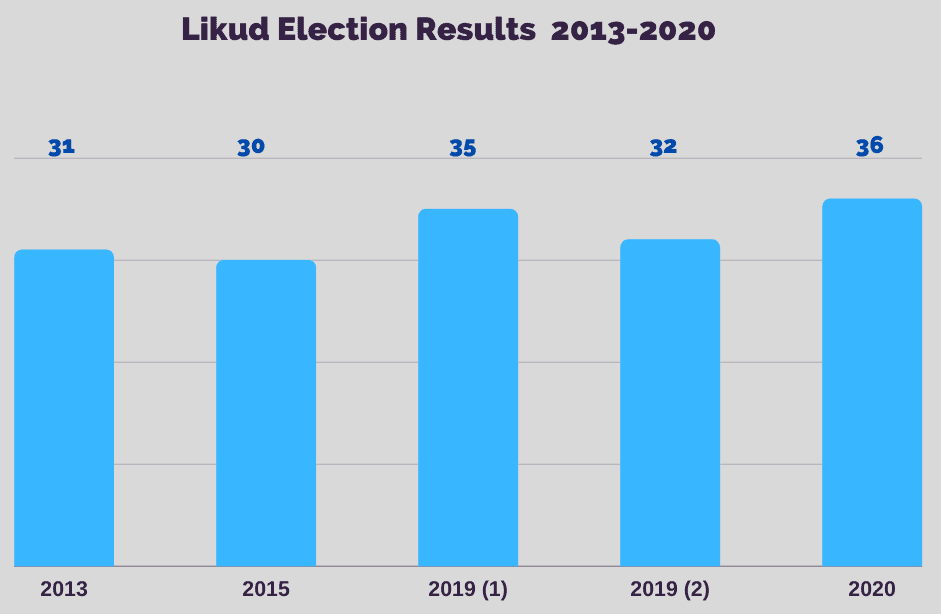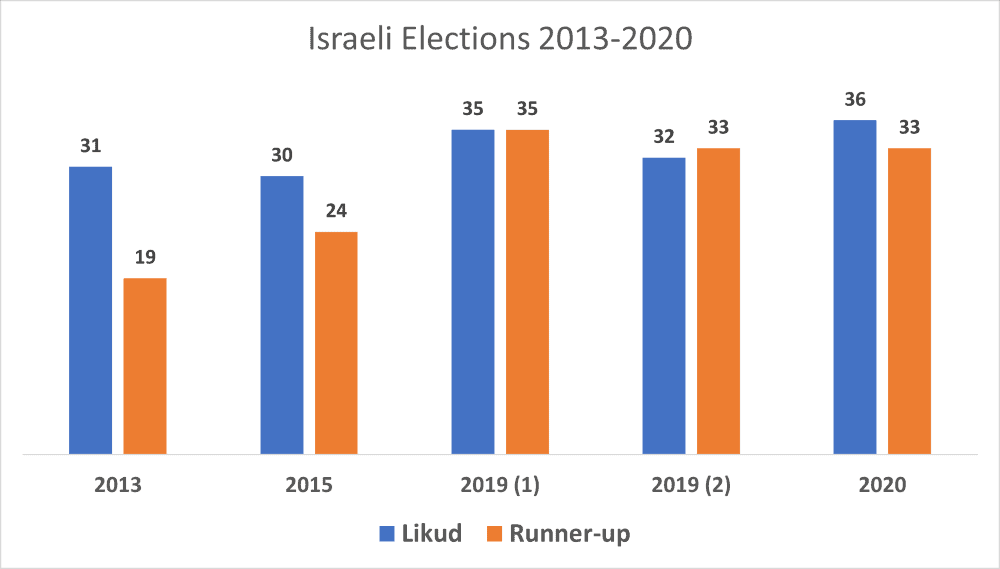Analysis of current poll numbers and Netanyahu’s performance in past elections shows that PM will have a hard time winning the 2021 Israeli election.

As Israel enters its fourth election season in two years, Benjamin Netanyahu is in trouble.
The prime minister is still the nation’s most skilled political player, but the 2021 Israeli election will pose the toughest electoral challenge in his career. Netanyahu will need to craft a brilliant strategy to win the upcoming contest. For now, the odds are against him.
The election campaign has just started, and much can change. Polling numbers will fluctuate, new players may join the fray, and unexpected developments are always a possibility. But if basic trends hold, and if we use history as a guide, Netanyahu stands to lose the March 2021 vote.
Looking at the data, below are three factors that will make it difficult for Netanyahu to win:
Attack from the right
In the past decade, Netanyahu’s Likud party has always been the largest in the right-wing camp, by far. But this time around, the PM faces a hostile rightist bloc that will likely be bigger than the ruling party.
New Hope, freshly minted by Likud renegade Gideon Sa’ar, is changing the balance of power. According to polls so far, the combined strength of Sa’ar’s new party, Naftali Bennett’s Yamina and Avigdor Lieberman’s Israel Beytenu is projected to total 35-40 Knesset seats.
Likud, meanwhile, has dropped below 30 seats. If the final numbers are anywhere near this framework, Netanyahu’s right-wing rivals can topple him by sticking together. Notably, all three have said that replacing the PM is their end goal.
The weak link may be Bennett, who has not explicitly ruled out a coalition with Netanyahu. The PM will surely entice his former defense minister with some tempting offers, but it may not be enough. The current polls show that Netanyahu will have trouble forming a government even with Bennett by his side.
While the numbers could still shift, Netanyahu will have a tough time fully reversing the trend. The erratic handling of COVID-19 and failure to deliver on pledges to annex West Bank land surely hurt his standing among some right-wingers. A likelier scenario is voters switching allegiances within the rightist anti-Netanyahu bloc, rather than a wholesale change in his favor.
The magic of 30
Likud’s decline from a high of 40+ Knesset seats in the polls a few months ago to the 25-29 range is clearly bad news for Netanyahu. In a historical perspective, this puts him in a dangerous zone where forging a coalition would be tricky.
In fact, Netanyahu hasn’t dropped below 30 seats since the 2009 election (when Likud won 27 compared to 28 by Tzipi Livni’s now-defunct Kadima). Back then he managed to form a government with the support of three rightist factions and the Labor party. This time around he can count on none of them.

At this junction, Netanyahu is only assured the support of ultra-Orthodox parties Shas and United Torah Judaism. Together, they combine for 44-48 seats for now, far from the 61 needed to secure a majority.
Under almost any scenario, Netanyahu will need the endorsement of one or two more parties that are hostile to him to some extent. Cobbling together a coalition will be a tough task unless he can engineer an unlikely arrangement or significantly improve his numbers.
The curse of the weak
Netanyahu tends to do very well when he faces a strong challenger. This enables him to siphon off votes from right-wing rivals by playing up voters’ fears about an outright Likud defeat.
In the past decade, Netanyahu faced a large opposition party in almost every election. The one exception was the 2013 campaign, when he teamed up with Lieberman for a mega-party that was far larger than any other. The joint ticket looked promising at first, but the ultimate results were grim.
The Netanyahu-Lieberman duo, initially projected to win over 40 seats, settled for 31. Moreover, two medium-sized parties – Yair Lapid’s Yesh Atid and Bennett’s Jewish Home – coordinated their positions to extract major concessions in exchange for joining the government.

While Netanyahu won, his position was weaker than expected and he was forced into an uneasy coalition. In the 2021 election he’s again likely to face mid-sized opponents, which would further hinder his campaign strategy. If a strong rival does emerge, it will be a rightist who will almost certainly take votes away from Netanyahu rather than the other way around.
Despite all of the above, Netanyahu may still work his magic and secure a stunning election win. After all, he proved time and again that he’s a gifted campaigner and master strategist. As noted, much could still change.
But even if Netanyahu wins, he will face yet another obstacle: Finding coalition partners that agree to grant him immunity from prosecution. This has become a crucial factor for the embattled PM as his corruption trial moves forward. If he fails to resolve his legal troubles, any election achievement will be a bittersweet victory.


